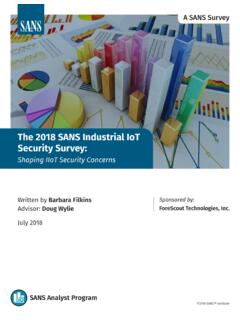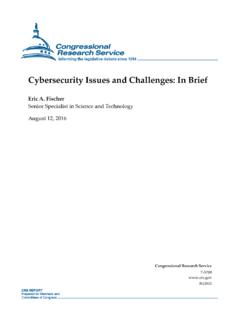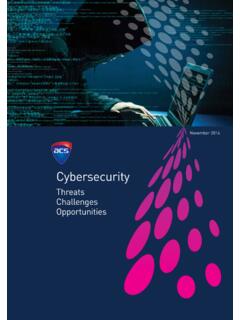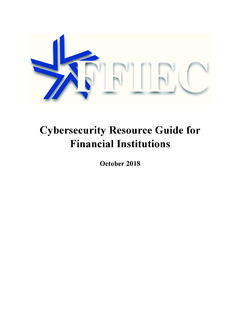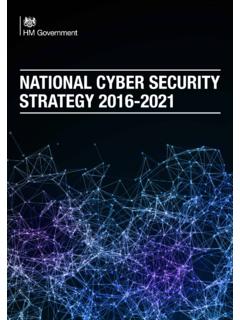Transcription of Final The Impact on COVID-19 on the Cybersecurity Sector
1 Copyright 2020 The Impact of COVID 19 on the Cybersecurity Sector The COVID 19 pandemic has created an unprecedented push for businesses and employees to change the way we work and communicate. Companies are being forced to rapidly digitalize their business models, create flexible and remote working environments, reach clients, and manage employees predominately through digital channels. This creates opportunity for the Cybersecurity Sector to be responsive to the rapidly escalating increase in the quantity of Cybersecurity attacks as well as an increasing number of businesses requiring Cybersecurity services. The demand for Cybersecurity professionals already has outstripped the supply before the COVID 19 pandemic impacted our lives.
2 In 2019, there was an estimated shortage of 500,000 Cybersecurity professionals in the alone, with Cybersecurity staffing shortages prevalent in nearly two thirds of Now, the gap is even wider, with an increasing demand for Cybersecurity specifically in industries such as healthcare (including pharmaceuticals and biotech), banking, and Also, the Cybersecurity and Infrastructure Agency (CISA) has named Cybersecurity engineers, risk management analysts, and information technology specialists as essential staff to assess infrastructure viability and security needs due to COVID 19 s As a result of this crisis, there are new demands that will be required of Cybersecurity professionals that will need to be addressed.
3 However, based on our analysis, there are also opportunties and insights that will inform 1 Lapena, R. (2020, February 10). No relief for Cybersecurity teams in sight, reveals Tripwire s latest skills gap report. Tripwire. of security/featured/tripwires skills gap report/ 2 Sweeny, C. (2020, March 27). Cybersecurity skills in higher demand than usual due to COVID 19. Wilson HCG. security skills in higher demand 3 T&D World (2020, March 21). CISA identifies critical workers amidst COVID 19 pandemic. utility operations/article/21126748/cisa identifies critical workers amidst covid19 pandemic Whitepaper Copyright 2020 ICF how the Cybersecurity Sector can adapt for the immediate future as well as for the long term.
4 New Demands A survey of existing Cybersecurity professionals found that over 80% have witnessed a change in their day to day job responsibilities due to COVID 19. Nearly half have transitioned from traditional roles to assisting with other IT related tasks, such as troubleshooting computer and networking problems, installing virtual private networks (VPNs), and manning helpdesks. This is likely to account for the increasing need for security services and networking for remote work environments. Additionally, nearly a quarter of Cybersecurity professional surveyed reported that Cybersecurity issues experienced by their organization have increased since transitioning to working Our analysis finds that there are three major ways which COVID 19 is likely to Impact the roles of Cybersecurity professionals now and over the long term.
5 Higher Frequency of Attacks The type of security attacks has not changed. What has changed is their increased frequency, as well as has the number of businesses and employees who are susceptible. While employees who work remotely are safer from exposure to the coronavirus, they put themselves at higher risk of contracting virtual viruses, coming in csontact withmalware, phishing, and other security attacks by using personal internet networks and devices. As a result Cybersecurity professionals are trying to put in place infrastructure so that organizations can adapt to the increasing security threats caused by remote working, including less secure networks, an increase in cyber criminals, and an increase in the number of ransomware attacks ( ,, attackers often claim to provide information or resources related to the coronavirus).
6 Between January and March, 2020, spam has increased by over 25 percent, malware by 35 percent, and blocking of URL clicks by over 55 Additionally, impersonations are on the rise. Industries that have been hiring many employees due to COVID 19 including retail and manufacturing have recorded the highest increases in attacks. Also, the increasing use of video conference platforms to communicate between employees can also put companies at risk, since not all communication platforms are secure, and not all require that security functions (such as passwords and encryption) are enabled. 4 Cision (2020, April 28). ISC2 survey finds Cybersecurity professionals being repurposed during COVID 19 pandemic.
7 Releases/isc survey finds Cybersecurity professionals being repurposed during covid 19 pandemic 5 Woollacott, E. (2020, May 5). Cybersecurity and COVID 19: The first 100 days. Forbes. Cybersecurity and covid 19the first 100 days/#1f00f23839d5 Copyright 2020 ICF Increased Number of Businesses Requiring Cybersecurity According to Talent Trends, only two in five companies report they were mostly or fully digital prior to the COVID 19 outbreak. We have seen the Impact of this rapid change with VPN use expanding by 66% at the end of Cybersecurity professionals are and will continue needed to help businesses rapidly transition to remote working environments by establishing remote security tools, root access to machines, and networking capabilities.
8 While some businesses may have already had these systems in place, many businesses and especially small businesses have yet to digitalize their business models. Where many businesses had previously leaned on physical and in office security for protection of their data and information, the transition to remote work means that these companies can no longer rely on secure office computers, networks, internet, and security procedures. Instead, they must pivot to ensure that every employee working from home is doing so safely and data is being transferred securely whenever they logon. This could mean ensuring that employees are using safe networks and using VPNs, and that they are appropriately following security protocols.
9 If employees are using personal computers or phones, businesses must also establish bring your own device security procedures that are followed by staff. Companies need to ensure both that employees data aren t being exposed to threats and that employees themselves aren t engaging in unsafe or malicious activities. This all may be challenging to companies who were not prepared to transition to digital business practices. Increased Security Needs for Certain Industries The healthcare Sector are expected to see an increased demand for remote security. Due to COVID 19, individuals are looking to online platforms for medical information and services.
10 While many healthcare organizations already have advanced internet driven services, they are still more risk prone, as attackers have been matching scams to the news and COVID 19 related misinformation, which especially targets these industries. These organizations are also dealing with much higher online traffic. Additionally, banks and insurance companies will be particularly impacted, as companies in these sectors tend to rely on older technology infrastructure that cannot physically be relocated or transferred online quickly. For instance, many insurance companies continue to run on mainframes, which require employees work in a physical office space.




